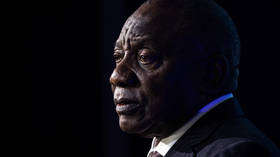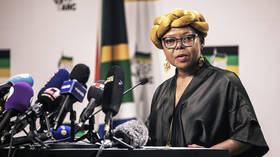South African leader to skip G7 – official

South African President Cyril Ramaphosa will not join other world leaders at the Group of Seven (G7) summit in Italy this week, his spokesperson said on Monday, according to Reuters.
Ramaphosa was reportedly scheduled to attend the meeting of G7 leaders from June 13 to June 15 in the southern Italian region of Puglia at the invitation of Italian Prime Minister Giorgia Meloni.
Rome currently holds the rotating presidency of the G7, an intergovernmental and political club consisting of the US, the UK, Canada, France, Germany, Italy, Japan, and the European Union. It is aiming to broaden the forthcoming gathering beyond the usual members. In addition to South Africa, several other countries are said to be on the guest list, including Algeria, Kenya, Mauritania, India, Brazil, Argentina, and Türkiye.
“The president [Ramaphosa] will not be attending the G7 meeting due to current domestic priorities he needs to focus on,” spokesman Vincent Magwenya told Reuters.
Ramaphosa’s African National Congress (ANC) is negotiating with a wide range of opposition parties about the possibility of forming a national unity government after losing its parliamentary majority in elections held on May 29.
The ANC obtained 40.18% of the vote – 159 seats in the 400-seat parliament – down from 230 in the previous election. It is the first time the party has lost its majority since Nelson Mandela led it to victory in South Africa’s first democratic elections after Apartheid ended in 1994.
The ANC, under pressure to reach an agreement before the new National Assembly holds its first sitting on Friday, said last week it has discussed various coalition government options with rivals, including the center-right Democratic Alliance (DA) and the far-left Economic Freedom Fighters (EFF).
The DA received 22% of the vote, equivalent to 87 seats, while the EFF received 9%, taking 39 seats. Former president Jacob Zuma’s left-wing Umkhonto Wesizwe Party, which won 15% of the vote with 58 seats, has refused to engage in negotiations with the ANC, the ruling party’s spokesperson, Mahlengi Bhengu-Motsiri, told reporters last Wednesday.
Ramaphosa, who is running for a second term, said last week that a “government of national unity is the most viable, most effective, and most powerful way of meeting the expectations of all South Africans.”
If Pretoria forms a national unity government, it would not be the first time, but rather a throwback to the era of former president Mandela, who led such a regime from 1994 to 1997 to promote inclusiveness in a nation divided by racial inequality.














